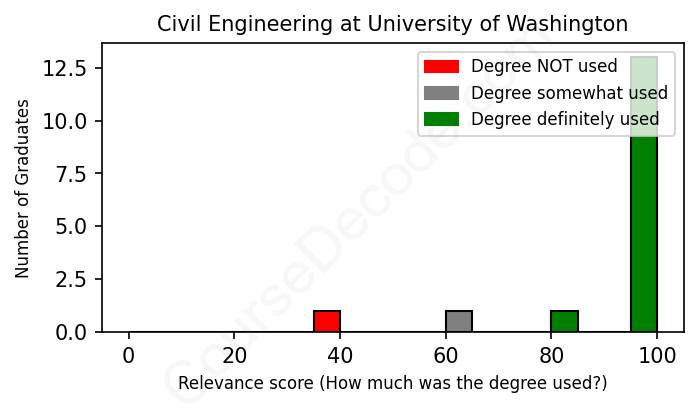
First, some facts. Of the Civil Engineering graduates from University of Washington we've analyzed , here's how many have used (or NOT used) their degree in their career:

These are estimates based on AI analysis of 16 LinkedIn profiles (see below).
The verdict? Great! Overall, with an average relevance score of 92%, Civil Engineering graduates from University of Washington have a substantially higher likelihood (+25%) of finding work in this field compared to the average graduate across all fields:
And for comparison, here's the chart for all profiles we've looked at across all degrees.
Also, after graduating, 37% of these graduates have pursued further education other than another Bachelor's degree (such as a Masters degree or other), compared to the average across all profiles of 35%. This suggests you may need more than just a Bachelors degree to be competitive as a Civil Engineering graduate.
See the details:
|
Relevance score: 100% We think this person has gone into a career highly relevant to their degree. We think this person has gone into a career highly relevant to their degree.
DEGREE INFOGraduated in 2015 from University of Washington with a Bachelor of Science (BS) in Civil Engineering. No other secondary education since. JOB HISTORY SINCE GRADUATIONCivil Engineer Seattle Department of Transportation Apr 2016 - Present ABOUTNo information provided. |
The top 10 most common jobs done by the graduates we've analyzed (ranked most common to least) are:
The graduates from the University of Washington with a degree in Civil Engineering have taken on a variety of roles, but the most common positions include Project Engineers, Transportation Engineers, and various technical engineering roles like Structural Engineers. Many of these jobs involve significant responsibilities that directly relate to civil engineering, such as project planning, design, cost estimation, and overseeing construction processes. It's clear that a vast majority of these professionals have found employment that aligns well with their educational background, utilizing their civil engineering skills regularly in the workplace.
However, there are a few exceptions. Some graduates have transitioned into roles like Software Engineers or Business Analysts, which don't directly leverage civil engineering concepts, although they may still utilize some analytical skills gleaned from their engineering training. Overall, it's safe to say that most of the jobs these graduates have taken are relevant to their field, reinforcing the notion that a Civil Engineering degree from the University of Washington opens many doors in the engineering world.
Here is a visual representation of the most common words in job titles for Civil Engineering graduates (this is across all Civil Engineering graduates we've analyzed, not just those who went to University of Washington):

From the looks of it, Civil Engineering graduates from the University of Washington generally have some solid career trajectories. Most of them kick off their journeys in roles that are closely related to their degree, often starting as engineers or in related positions like estimators and project managers. For instance, recent grads who landed jobs at places like the Washington State Department of Transportation and the Port of Seattle are already working on significant infrastructure projects, which really aligns with what they studied.
Fast forward about 5 to 10 years down the line, and you can see many of these graduates moving up into senior roles. A lot of them transition into project management positions or take on more specialized roles within their companies, like senior engineers or even moving into different sectors like naval architecture. While a few have ventured into tech-related roles, most stick to civil engineering-related jobs, which is a good sign. So overall, it seems like these graduates are finding fulfilling and relevant careers, making good use of their degrees in a field that’s super important for our infrastructure and communities.
Honestly, a Bachelor’s degree in Civil Engineering, whether at the University of Washington or elsewhere, can be pretty challenging. It’s definitely on the tougher side compared to many other degrees because you’re diving into a mix of math, physics, and engineering principles, plus a ton of hands-on projects and labs. You’ve got to be ready to tackle subjects like statics, structures, and fluid mechanics, which can be pretty intense. At UW, you'll find a solid program with rigorous coursework, so you’ll need to stay on top of your studies and be prepared to put in some serious effort. That said, if you’re passionate about it and willing to work hard, it can also be really rewarding!
Most commonly, in the LinkedIn profiles we've looked at, it takes people 4 years to finish a Bachelor degree in Civil Engineering.
So, looking at these Civil Engineering graduates from the University of Washington, it seems like most of them have made decent money over the years, especially as they've moved into higher positions like project managers and senior engineers. The earlier grads started in roles that might not pay top dollar, like field engineer and estimator positions, but they quickly climbed the ladder into more lucrative roles. The more recent grads are starting to fill in those roles, too, and since most of them are already in steady positions, it looks like they’re on track to earn well as they gain experience. Of course, some might earn more than others depending on their specific jobs or locations, but overall, it looks like a solid path for these engineering folks!
Here is a visual representation of the most common words seen in the "about" section of LinkedIn profiles who have a Bachelor degree in Civil Engineering (this is across all Civil Engineering graduates we've analyzed, not just those who went to University of Washington). This may or may not be useful:

Here are all colleges offering a Bachelor degree in Civil Engineering (ordered by the average relevance score of their Civil Engineering graduates, best to worst) where we have analyzed at least 10 of their graduates: